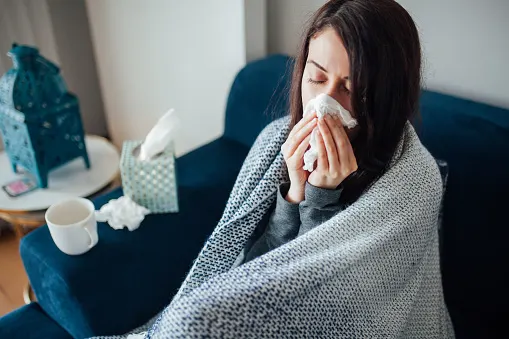
Chilly winter weather and catching a cold, what's the link?
Many people associate the freezing temperatures and icy winds in the winter months with catching a cold. While the dropping temperatures are not directly responsible for making you sick, there are some correlations between cold weather and the common cold.
Pharmacist Victor Wong says that the cold weather can lower our immune systems, which makes us more susceptible to catching an illness. "The dry air and cold air causes our mucus to be more stagnant and not work as well, which causes the viruses to be trapped in our bodies and we cannot excrete them out easily, which allows them to infiltrate our bodies and defences much more easily," explains Wong.
Viruses behave differently depending on the environmental conditions and Wong says that cold weather often causes viruses to thrive in the winter. "This is actually the perfect time for them to grow and to spread."
Warm indoor locations are another place where viruses can spread. While heating keeps indoor temperatures comfortable, the hot air from central heating units is extremely dry and significantly reduces the humidity levels in the room.

Credit: Michael Shannon
Dry indoor air leads to dry skin, itchy eyes, irritated nasal passageways, dry and itchy mouths, and can exacerbate existing cold symptoms. To prevent this, Wong says that using a humidifier or vaporizer in the home can maintain humidity levels in the home, improve overall comfort, and reduce symptoms caused by dry air.
Spending more time indoors also means less exposure to sunlight, which has been correlated to Seasonal Affective Disorder, which is the condition of feeling ‘down’ in the depths of winter, explains Wong.
"This condition can lead to feelings of irritability, loss of energy, tendency to oversleep, difficulty concentrating and reduced appetite. Seasonal affective disorder, in combination with cold symptoms, makes the experience so much worse. Also, less sunlight means less vitamin D which important for your bodies to maintain a strong and healthy immune system."
Wong says that colds can last between one to two weeks, but certain things can help us feel better as we recover, such as eating healthy foods, soups, and drinking warm liquids with honey and lemon. A saline rinse can also help wash out the mucus and throat lozenges can soothe throats by reducing irritation and coughing.
With files from Rachel Schoutsen.










